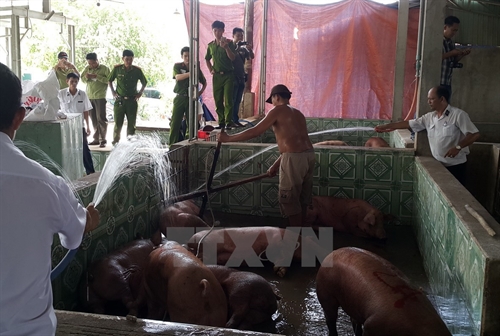 Society
Society

The two largest private abattoirs in HCM City, which supply thousands of pigs to the market everyday, will be closed down on June 30. All substandard private abattoirs will also be closed by the end of next year, the municipal People’s Committee said.
 |
| Inspectors from the southern province of Bình Dương have detected several cases involving the use of banned substances in animal husbandry over the past week. — VNA/VNS Photo Chí Tưởng |
HCM CITY — The two largest private abattoirs in HCM City, which supply thousands of pigs to the market everyday, will be closed down on June 30. All substandard private abattoirs will also be closed by the end of next year, the municipal People’s Committee said.
According to the plan for slaughterhouses in the city from 2016-20, which was approved by the committee recently, the city would step by step remove all private abattoirs and replace them with industrial ones to assure food hygiene and safety.
Nam Phong abattoir in Bình Thạnh District and Hiệp Bình Chánh abattoir in Thủ Đức District will be forced to close down next month.
The two abattoirs, as well as many private facilities in the city, reportedly failed to meet hygiene requirements. The slaughter was conducted on dirty floors and waste water was discharged directly into rivers, causing pollution to the environment.
Cattle and poultry from the offending slaughterhouses would be moved to Bình Tân industrial abattoir in Bình Tân District and Vissan Co.,Ltd for slaughter. By 2017, all cattle and poultry will be slaughtered in six industrial abattoirs in Hoc Môn and Củ Chi districts with capacity of between 1,000 and 1,500 cattle per day, the committee said.
Early this January, the city’s Market Watch found 124 pigs that tested positive for salbutamol, a substance banned in breeding in Việt Nam.
The city’s Veterinary Department said that it was difficult to inspect all private slaughterhouses due to their small-scale and irregular operations. Most were illegal and barely met hygiene standards.
Two private abattoirs in Tân Phú Trung and Tân Thạnh Đông communes in Củ Chi District were examples. Local residents complained about the noise and pollution from the abattoirs and reported the situation to authorities.
However, the two abattoirs have continued to operate at a capacity of hundreds of cattle per night. Workers at the abattoirs reportedly refused to talk with reporters.
Figures from the department showed that there were about 30 slaughterhouses in the city, including 26 for pigs, two for cattle and two for poultry.
From 2011-15, the department handed out 186 fines for illegal slaughtering.
Slaughter houses to be punished for trading cattle with banned substance
Inspectors from the southern province of Bình Dương have detected several cases involving the use of banned substances in animal husbandry over the past week.
The provincial Livestock, Veterinary and Fishery Department last Wednesday gave an unexpected inspection of a slaughterhouse owned by Phan Văn Chiến who resides in Bến Cát Town’s Mỹ Phước Ward and took urine samples of 9 pigs set to be slaughtered for testing.
All the pigs tested positive for Salbutamol, a banned substance with concentrations up to 64.5 parts per billion (ppb).
After the tests, when the provincial Department of Animal Health returned to the abattoir, they found the company had replaced the nine tested pigs with others and had slaughtered and sold five of the contaminated animals. Authorities retrieved and seized meat contaminated with the banned substance.
Another slaughterhouse in Bến Cát Town was also found to be trading pigs contaminated with banned substances.
Tests showed that all 15 pigs at a slaughter house owned by Đỗ Văn Thuyên were positive for Salbutamol with concentrations up to 49.4 ppb.
Inspectors proposed a VNĐ12.5 million (US$560) fine for Chiến and Thuyên for the violations. In addition, Chiến had to pay an additional VNĐ2.5 million ($112) for replacing five of the tested pigs with other pigs.
Chiến and Thuyên had also supposed to pay costs for testing and destroy all pigs that tested positive for banned substances. — VNS




